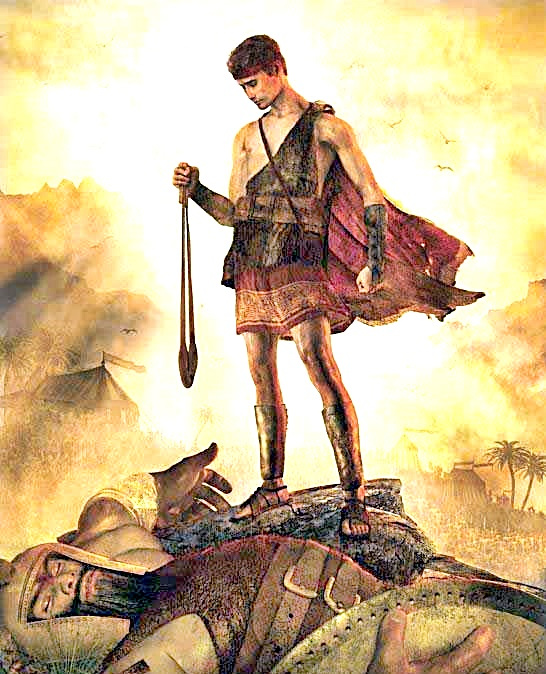David’s Kingship – Worthy of Praise or Protest?

Was King David a Model King?
 King David is renowned as one the most beloved leaders of ancient Israel. Known as a man after God’s own heart, David’s military expertise, courage and humble devotion to prayer make him a model leader. That is, until you come to understand the devastating impact his choices have on countless lives. With so much blood spilled by David’s own hands, God refuses his offer to build the sacred Temple in Jerusalem. Nevertheless, the young boy with “ruddy” hair is precisely anointed by God with good reason. By careful examination of David’s character strengths and flaws, I hope to show why he is indeed worthy to be called a great King.
King David is renowned as one the most beloved leaders of ancient Israel. Known as a man after God’s own heart, David’s military expertise, courage and humble devotion to prayer make him a model leader. That is, until you come to understand the devastating impact his choices have on countless lives. With so much blood spilled by David’s own hands, God refuses his offer to build the sacred Temple in Jerusalem. Nevertheless, the young boy with “ruddy” hair is precisely anointed by God with good reason. By careful examination of David’s character strengths and flaws, I hope to show why he is indeed worthy to be called a great King.
Praise Worthy
You may have first heard about the boy David in the incredible story of his standoff with the terrifying Philistine called Goliath. He shows great courage by boldly volunteering for the impossible job to take down the towering giant. The young shepherd won’t allow the well armored brute to toss insults about God or his people. He says “Let no one’s heart fail because of him; your servant will go and fight with this Philistine” (1 Samuel 17:32). Though hearing Goliath’s taunts, David takes his time to tactically prepare for the fight just as brilliant generals do. Choosing no battle gear, five stones and his familiar sling, he kills him with one stone’s blow to the forehead (1 Samuel 17). On this very day, David shows his great faith and love of God that would imprint his life forever.
David’s courage came to the aid of the Israelite people one battle after the other. In the fight against the Philistines at Rephaim, he hears that his attackers are searching for him. David valiantly goes to the stronghold to meet them right where they are. Emerging triumphant, he returns the Ark of the Covenant to Jerusalem (2 Samuel 6). More remarkable than his military genius is how David celebrates the victory. Praising God, David “dances before the Lord with shouting and with the sound of the trumpet as the Ark of the Lord came into the City of David” (2 Samuel 6:14). He is the only King of Israel who sings his love for God out loud. Though a King, David openly prays for divine help in troubling times. This quality shows his great faith in God in good times and bad.
At a losing point in the battle, God hears David’s prayers and advises “not to go up the valley of Rephaim but around it opposite the balsam trees. When you hear the sound of marching, I will go out before you to strike” (2 Samuel 6:22). Though David wins, he does not grandstand before his men with pride. He kneels praising God for delivering him from defeat.
Kingly Flaws
Despite these character strengths, David proves to be a man who acts carelessly and on selfish impulse. In a well known example, He takes another man’s wife without thinking about the consequences. When she becomes pregnant, he conceals his selfish actions by creating the inevitable circumstances of her husband Uriah’s death (2 Samuel 11:14). Even after he is killed, David shows no remorse. He recognizes the sin of his deeds only after Nathan the Prophet communicates God’s displeasure. Rather than deal with difficult issues requiring leadership, he simply ignores them. We see this poor trait especially in David’s inability to hold his son Amnon accountable for the incestuous rape of Tamar. Though angered by his terrible crime against his own daughter, David prioritizes Amnon’s value as his firstborn over her pain (2 Samuel 13:21). This puts his whole family in duress, ultimately leading to his son Absalom’s decision to take justice into his own hands and kill his brother.
No Lamentation
Unfortunately, the impact of David’s poor choices go beyond his family. The Israelite people greatly suffer as a result of his poor judgment. For example, when David parts with his reliance on God by ordering a census of the people of Israel and Judah, great tribulation comes as a result of this sinful quest for power. Though his general Joab warns against it, David proceeds anyway. Ultimately, God allows a plague to kill seventy-thousand people as the price of his self serving plan. This number is in addition to the thousands of men, women and children killed as a result of David’s efforts to unify Israel. As in Uriah’s death, David does not lament the loss of so many lives.
King David’s Legacy
Now that we have considered the pros and cons of David’s character, we are left with one fundamental question – is he worthy to be called a great King? I answer with a humble yes! It is true that David in his humanity made terrible mistakes. And along that path, God severely punishes him. By committing adultery, he loses a beloved son born from that sin. Yet, David never lashes out with anger against God. He grieves by sorrowfully prostrating himself on the floor, pleading for God’s mercy and forgiveness. When he acknowledges his sinful intent behind the census, David asks God to only lay His hand against him and his own father’s house as just punishment. His love as a father overcomes the immense pain of Absalom’s betrayal. His men are instructed not to lay a hand on him. When failing God, David transforms his repentant heart to words and songs that inspire great faith. Psalm 23 is the story of King David’s life. He is a hunted man facing tribulation every day.
Yet, his poetic words echo what makes him worthy to be called great – his constant plea to God’s mercy, his rock and salvation. God is the saving rock David chose to slay Goliath and he held on to it all his life. King David wrote Psalm 23 so that the world would know never to lose hope because God is always with us – flaws and all.


Leave A Comment